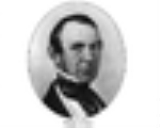
Thomas Aspinwall Davis
Encyclopedia
Thomas Aspinwall Davis (December 11, 1798 – November 22, 1845) was a silversmith
Silversmith
A silversmith is a craftsperson who makes objects from silver or gold. The terms 'silversmith' and 'goldsmith' are not synonyms as the techniques, training, history, and guilds are or were largely the same but the end product varies greatly as does the scale of objects created.Silversmithing is the...
and businessman who served as mayor of Boston for nine months in 1845.
Early life
Davis was born on December 11, 1798, in Brookline, MassachusettsBrookline, Massachusetts
Brookline is a town in Norfolk County, Massachusetts, United States, which borders on the cities of Boston and Newton. As of the 2010 census, the population of the town was 58,732.-Etymology:...
, the son of Ebenezer Davis III and Lucy Aspinwall. Both the Davis and Aspinwall families were longtime residents of Brookline. Thomas' elder brother Increase Sumner Davis became a Congregational
Congregational church
Congregational churches are Protestant Christian churches practicing Congregationalist church governance, in which each congregation independently and autonomously runs its own affairs....
minister. Thomas grew up on Harrison Place (now Kent Street), and began work in a jeweler's shop in Boston at age 14.
Business career
By 1820, he was in partnership with Thomas N. Morong. He had his own business 1825–34, and was a partner of Julius Palmer and Josiah Bachelder from 1838. The firm was successful, after his death known as Palmer, Bachelder & Co. By 1843 he had acquired, by inheritanceInheritance
Inheritance is the practice of passing on property, titles, debts, rights and obligations upon the death of an individual. It has long played an important role in human societies...
and purchase, farmland around his father's house, which he subdivided
Subdivision (land)
Subdivision is the act of dividing land into pieces that are easier to sell or otherwise develop, usually via a plat. The former single piece as a whole is then known in the United States as a subdivision...
to create The Lindens, a prestigious suburb
Suburb
The word suburb mostly refers to a residential area, either existing as part of a city or as a separate residential community within commuting distance of a city . Some suburbs have a degree of administrative autonomy, and most have lower population density than inner city neighborhoods...
an residential development designed by Alexander Wadsworth and John F. Edwards. Davis' own house
Thomas Aspinwall Davis House
The Thomas Aspinwall Davis House is a historic house at 29 Linden Place in Brookline, Massachusetts. It belonged to Thomas Aspinwall Davis, a mayor of Boston. It was moved to its present location early in the 20th century.-References:...
was at the head of Linden Park, until it was moved to 29 Linden Place in 1906. In 1985 it was added to the List of Registered Historic Places in Brookline.
1844 election
At the time Davis ran for mayor a majority was required to be elected, if no candidate received a majority of the vote a new election was held. A candidate did not have to have run in the previous election, and previous candidates did not necessarily run in subsequent elections. On the first election held on December 9, 1844 in addition to Davis, the candidates were Josiah Quincy, Jr and Adam W. Thaxter, Jr. In the December 9, 1844 election, Quincy received 4,457 votes, Davis 4,017 and Thaxter 2,115, with a scattering of 232 votes going to others. Because none of the candidates had received a majority of the 10,821 votes cast no one was elected mayor. In each of the six elections held between December 23, 1844, and February 12, 1845 there were at lest three major candidates in contention for the mayoralty, as a result no one candidate received a majority of the vote.In the eighth and final election held on February 21, 1845 there were only two candidates, Davis and William Parker, in that election Davis received 4,865 votes, Parker received 4,366 and there was a scattering of 322 votes, Davis defeated Parker by 499 votes and receiving a majority of the 9,553 votes cast.
Mayoralty and death in office
There had been seven inconclusive elections for mayor of Boston since December 9, 1844, before Davis' victory on February 21, 1845. It was Davis' third attempt at the ballot, representing the Native American Party, which had split from the WhigWhig Party (United States)
The Whig Party was a political party of the United States during the era of Jacksonian democracy. Considered integral to the Second Party System and operating from the early 1830s to the mid-1850s, the party was formed in opposition to the policies of President Andrew Jackson and his Democratic...
s the previous year. One source lists his opponents as Whig Josiah Quincy, Jr, and Democrat Adam W. Thaxter, Jr; another says Davis received 4,865 votes, ahead of William Parker with 3,341, and others. He was sworn in on February 27. His term of office was uneventful. He tendered his resignation on October 6 owing to ill health, and he died on November 22, 1845. One source says his resignation was not accepted, and thus he died in office. John Pierce delivered an address at his funeral in Central Church on November 25.
In records published by the city of Boston list Davis' term is cited as ending on November 22, 1845.
Personal life
He married Sarah Jackson, the niece of abolitionist Francis JacksonFrancis Jackson (abolitionist)
Francis Jackson was an abolitionist in Boston, Massachusetts. He was affiliated with the Massachusetts Anti-Slavery Society, the Boston Female Anti-Slavery Society, the American Anti-Slavery Society and the Boston Vigilance Committee...
, on November 11, 1824 in Newton, Massachusetts
Newton, Massachusetts
Newton is a city in Middlesex County, Massachusetts, United States bordered to the east by Boston. According to the 2010 U.S. Census, the population of Newton was 85,146, making it the eleventh largest city in the state.-Villages:...
.

